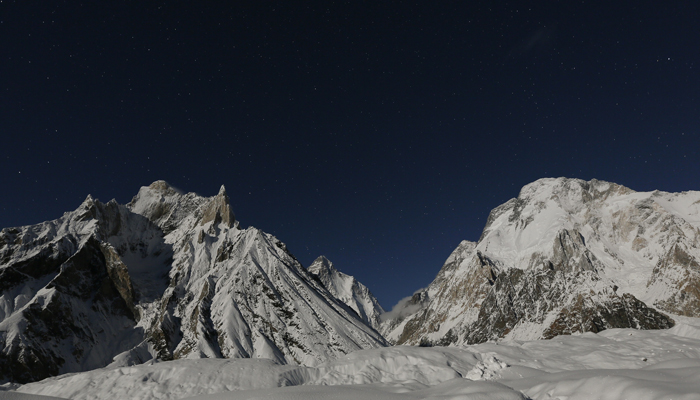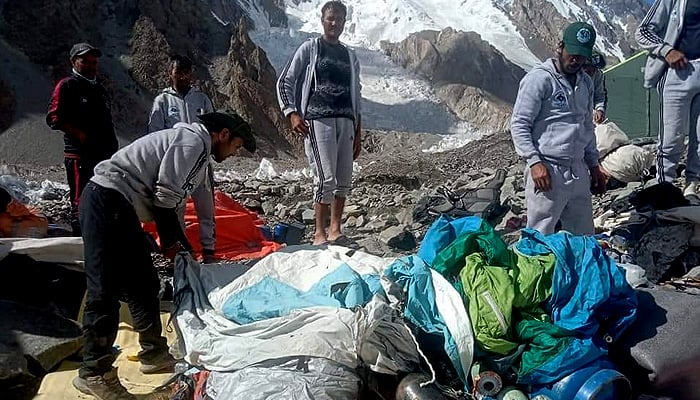As tourism increases, K2 needs a clean up campaign now
The world’s second-highest peak, K2, is increasingly becoming more crowded and a dumping site for used tents
September 24, 2022

Pakistan is blessed with marvellous mountains, right from the Margalla Hills in Islamabad to Galiyat in Murree and the Karakoram, Hindu Kush and Himalaya ranges. All are great tourist attractions.
Most of these mountain valleys are blessed with natural freshwater streams, lakes and rivers. Some destinations are popular among domestic tourists, while high peaks are heaven for mountaineers.
But it is unfortunate to see that a large number of tourists and climbers are insensitive towards nature, and their unfriendliness has turned the vast areas of natural land, including tourist destinations and the high altitude mountains, into waste dumps.
Even the hospitality and tourism service providers are environment-insensitive and lack an adequate waste management system. Mountaineers don’t take back their waste; perhaps this is impossible for them. It seems that the regulators have no idea about their responsibilities.
They have given a free hand to several violators including the timber and housing mafias and the hospitality sector. The present condition of places like the Margalla Hills, Murree, Galiyat, and the Naran and Kaghan valleys is a glaring example of the overexploitation of nature and natural resources.
High-altitude mountains in northern Pakistan are still heaven for mountaineers, climbers and trekkers. But, they are unkempt and neglected. Visitors do not take responsibility to clear their waste. Most of Pakistan’s 8,000-plus-metre mountain peaks are in the Central Karakoram National Park (CKNP), which charges only $200 per climber as the entry fee.

The companions and Sherpa who accompany these climbers are not charged any entry fee that ranges from $100 to $200 usually. A year back, a Vietnamese mountaineer took along with her more than 400 staff and porters.
The CKNP shall consider revising its rules and regulations to make the climbers pay for their staff and Sherpa or impose an equal amount for the cleanup of the mountains right from K2 base camp to Camp 4.
The world’s second-highest peak, K2, is increasingly becoming more crowded and a dumping site for used tents, ropes, drums and several other kinds of waste.
This is fast happening after the Pakistan government, especially the Gilgit-Baltistan government, turned a blind eye towards the increasing engagement of the Sherpa from Nepal in various K2 expeditions. The GB and federal governments need to open their eyes wide to see the garbage collected by Pakistani climbers and high-altitude potters during the K2 cleaning campaign held in August 2022.
The participating climbers of the K2 cleanup have bluntly mentioned that from base camp to Camp 4, the mountain has become a dump of filth. In a recent CKNP K2 cleanup drive, these people collected more than 1,610kg of garbage that was thrown there by foreign mountaineers and their staff.
They believe that this sorry state will continue until the engagement of foreign climbing staff is not controlled. These people, usually in the hundreds, go with climbers for free. Some fees should be imposed for every accompanying person. This is likely to limit the number of entrants into the base camps that are causing unnecessary filth and waste.
The month-long K2 cleanup campaign collected all sorts of items used during the expeditions, including oxygen cylinders, tins, old ropes, tents and others. The waste on the high-altitude mountains poses threats to the sensitive mountain ecosystem.
The foreign Sherpa’s unfriendly practices towards the environment and the ecosystem have resulted in degradation. Extremely commercialized patterns of mountaineering and excessive human interventions have posed severe threats to the K2 environment.
The facilitators of foreign expedition facilitators are making huge profits at the cost of Pakistan’s mountain ecosystem and the livelihood of the locals. This needs to be checked at the earliest.
The CKNP directorate believes that the fee collected from each expedition for the cleanup of K2 is very low as compared to the number of entrants and the amount of pollution they make on the mountains, and its impact on the lives of the locals and the people living downstream.
We all are on the mercy of the expeditions that bring some revenue. But the intangible costs are never counted that may be higher than what we earn.
I strongly believe that the cost-benefit quotient must include the intangible costs, which are the waste left behind by climbers and its impact on the health of the locals, natural resource degradation, glaciers melting and consistent additional impact to climate change vulnerability.
Yasir Rizvi, the CKNP K2 cleanup campaign manager, states the campaign officially started on July 19, 2022 with a formal briefing session at the CKNP Headquarters Skardu and concluded on August 18, 2022. The full cost of the cleanup was covered from the fees collected from all the visitors of the CKNP.
We engaged all the local expert climbers for the campaign at relatively lower wages to thoroughly complete the task. They generously did the campaign with dedicated hard work and to the entire satisfaction of the managers despite inclement weather.
Rizvi adds that this year the trek was overcrowded as hundreds of people headed together to K2, resulting in huge amounts of waste. Unfortunately, most international, national and local climbers carried their waste up to their tents.
They dropped waste in various upper camps of K2, due to which there were fears of severe negative impacts on the ecosystem.
The GB government needs to urgently pay heed to the increasing challenges being faced by K2 as the total number of visitors to this area has increased to 3,857 in 2022 from 668 in 2011.
As the federal government has taken several tourism-friendly measures, visitors to GB will be increasing enormously, resulting in more waste and pollution.
The damage to the mountain ecosystems will be unprecedented. The government should take the necessary steps to manage and control the situation. It must strengthen the relevant institutions and departments before it is too late.
The writer is a freelance journalist and broadcaster, and director of Devcom-Pakistan. He can be reached at [email protected] and tweets @EmmayeSyed











